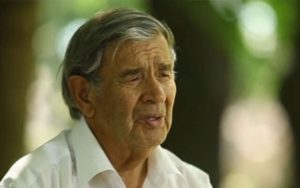SHARE WITH FRIENDS:
“Cha Novcha Niholcha is still fighting to the death, as the ancestors of the war said, he was ruthless and cruel. One by one the green leaves withered and surrendered, and life on the branches came to an end. "My body is still alive," he said with a sigh. "I have to live, of course I live." He looked around, as if expecting help from someone. He looked at the street once more to see if the children who had planted me here and dragged me on the asphalt would come. He stared at the sky for a long time, hoping for raindrops. Interestingly, they all died standing up… Last year, on the same night, they were all alive and flourishing… And now… "No, I have to live…"
"Water!" Water! Water!
Gradually, the handsome young man fainted, became intoxicated with some kind of magical fantasy, and died that day, June 19, at six o'clock in the afternoon.
He froze as he stood up.
This is an excerpt from one of the masterpieces of the famous writer Khudoiberdi Tokhtaboyev - "Nohollar nolasi". Children love to read this work and draw their own conclusions. Indeed, the seedling has the same soul as man, and needs food and water; If not taken care of, the young reader will be heartbroken and die.
Khudoiberdi Tokhtaboyev is a favorite writer of children of all ages. He is known to the reader as a talented writer who has made a significant contribution to the development of adventure and fiction genres in modern Uzbek children's literature.
Khudoiberdi Tokhtaboyev was born on December 1932, 17 in Katta Tagob village of Uzbekistan district of Fergana region in a peasant family. Like other children, Khudoiberdi Tokhtaboyev grazed herds, plowed the land, picked cotton, and did his best in all areas of the village. He began to know from a young age what life was all about.
During the Second World War, the future writer dropped out of school, worked in the fields, worked as an accountant, and worked hard.
Khudoiberdi Tokhtaboyev, a successful graduate of the Kokand Pedagogical School, was a teacher in his native village, where he developed a passion for science. Therefore, he left teaching and entered the Tashkent State Medical University. Here Alisher Navoi, Bobur, G. He loved and studied the works of Gulom, Oybek, H. Olimjon, A. Qahhor.
After graduating from university, he worked as a teacher in Baghdad district. The head of the scientific department worked as a director and helped young people to enjoy the light of science. Poetry exercises began to be published in periodicals. This invited the future writer to the center - Tashkent, to seriously engage in creative work. And so it happened. He moved to Tashkent in 1958. He started working for the Tashkent Haqiqati newspaper.
-
H. Tokhtaboyev grew up to be a true word, honest, clean and hardworking. While working for the newspaper, he saw some dirty people and could not digest their actions. He decided to reveal the secrets of such people and to expose the evils of the hypocrites among the people. In this regard, he was able to use the feuilleton genre. In 1962 he started working as a columnist for the oldest newspaper of the republic - "O'zbekiston ovozi". He wrote more than 300 feuilletons here.
